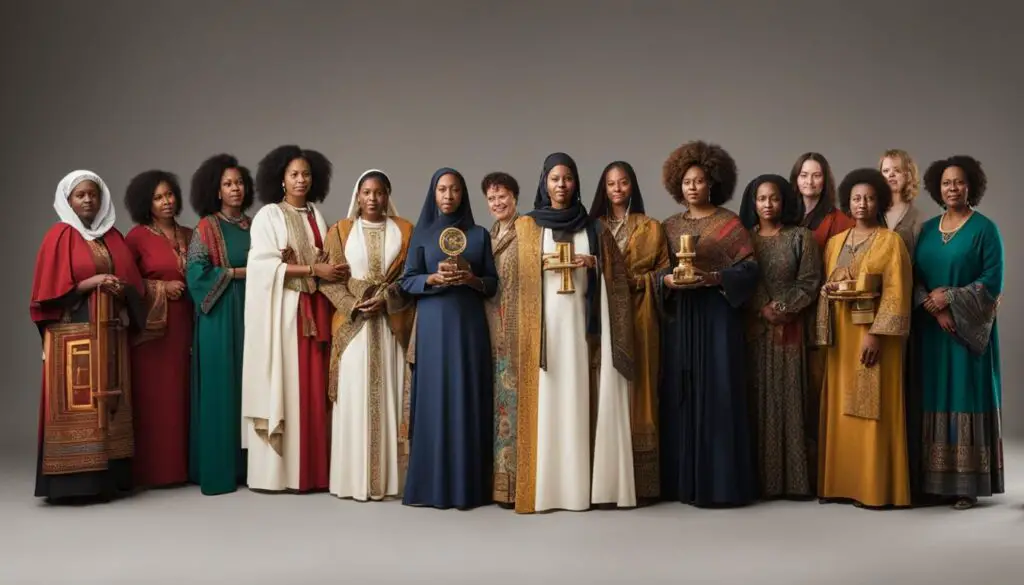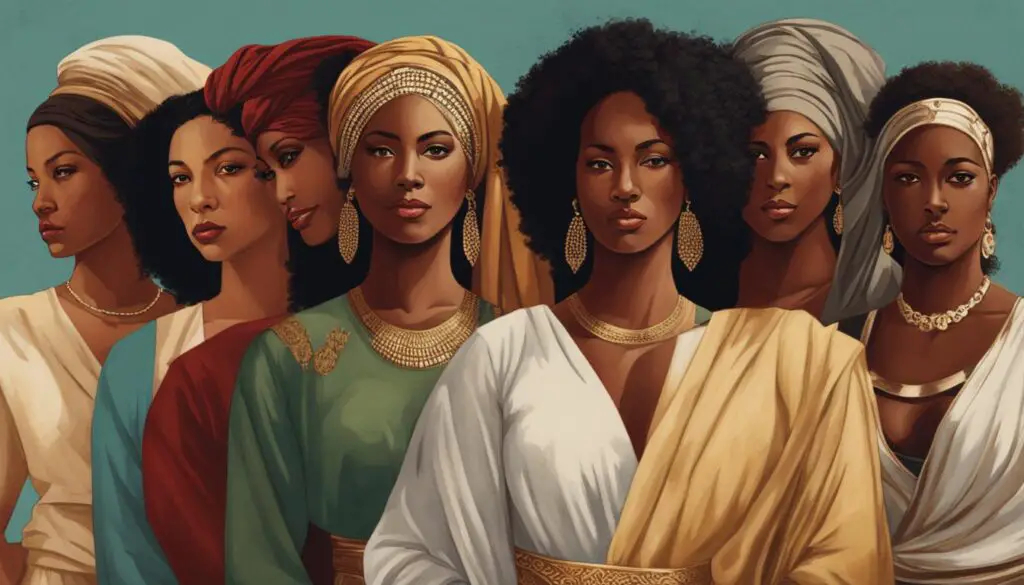In the Bible, the term “woman” holds immense significance as it represents the biblical perspectives on womanhood, encompassing roles, strength, and significance. Exploring the rich history of women in the Bible reveals their pivotal contributions and the profound impact they have had on the faith of believers.
Key Takeaways:
- Woman in the Bible carries profound biblical perspectives on womanhood.
- Roles, strength, and significance of women are highlighted throughout biblical history.
- Exploring the stories of women in the Bible provides valuable insights and inspiration.
- Understanding the biblical perspective on womanhood promotes a holistic view of women’s contributions.
- The Bible emphasizes the value, worth, and respect for women.
Woman in the Creative Plan
In the creative plan of God, the woman holds a special place. As stated in the Bible, the woman was formed from the rib of man, demonstrating the inseparable unity and fellowship of their lives. This symbolism emphasizes the importance of women in the divine plan and highlights the roles they play in the overall harmony of creation.
The woman is not merely an assistant to man but a complement to him. She is essential for the perfection of his being. This concept of unity and partnership is essential in understanding the biblical perspective on womanhood. It emphasizes that men and women are equal partners in the creative plan of God, each bringing their unique strengths and qualities to the table.
“And the rib, which the Lord God had taken from man, made he a woman and brought her unto the man.” – Genesis 2:22
Furthermore, this narrative reinforces the equality between men and women in their creation. Adam acknowledges the woman as “bone of my bones, and flesh of my flesh” (Genesis 2:23), signifying their mutual interdependence. This enforces the idea that men and women are destined to work together in unity, sharing roles and responsibilities, and cherishing their partnership.
Recognizing the importance of unity, fellowship, and equality in the creative plan, we gain a deeper understanding of the significance of women in the biblical narrative. Their contributions are essential for the fulfillment of God’s purpose, and their roles should be valued and respected.
Woman in Old Testament Times
In the Old Testament, women held a prominent position and enjoyed social equality, which was in stark contrast to the prevailing norms of the surrounding heathen nations. The Hebrew society valued women highly and acknowledged their significant contributions to various aspects of life.
One area where women experienced social equality was in marriage laws. Unlike the practices of neighboring cultures, Hebrew marriage laws protected the rights of women. These laws emphasized the importance of consent and provided avenues for divorces, ensuring that women were not trapped in abusive or unsatisfactory marriages.
Furthermore, women in the Old Testament also had inheritance rights. They were entitled to receive an inheritance from their fathers if they had no brothers. This ensured that women were not left destitute and allowed them to maintain a certain degree of financial independence.
While women in the Old Testament had domestic duties, they were not limited to traditional gender roles. Many women played crucial roles in shaping the destiny of the nation, such as Deborah, who served as a judge and military leader. Others, like Esther, used their intelligence and courage to save their people in times of crisis.
| Aspect | Prominence |
|---|---|
| Marriage Laws | Emphasized consent, protected rights |
| Inheritance | Entitled to receive inheritance |
| Domestic Duties | Had domestic duties but not limited to traditional gender roles |
| Leadership | Women like Deborah played crucial roles as judges and military leaders |
Overall, the Old Testament reflects a society that valued women and recognized their important contributions. Women held prominent positions, enjoyed social equality, and had opportunities to play significant roles in various spheres of life. The biblical portrayal of women in the Old Testament challenges traditional notions of gender roles and highlights the strength, intelligence, and resilience of women in biblical times.
Woman in New Testament Times
In the New Testament, women played significant roles in the ministry and life of Jesus and the early church. These women served as powerful examples of faith, dedication, and service, contributing to the spread of the Gospel and the growth of the early Christian community.
One of the most well-known women in the New Testament is Mary, the mother of Jesus. Mary’s faith and obedience to God’s plan for her life are highlighted in her acceptance of the role of being the mother of the Messiah. Another notable woman is Elisabeth, the mother of John the Baptist, who experienced a miraculous pregnancy in her old age.
“Blessed art thou among women, and blessed is the fruit of thy womb!” – Luke 1:42
Jesus himself interacted with and ministered to many women during his earthly ministry. He treated women with dignity and respect, challenging societal norms and cultural expectations. Jesus elevated the status of women by valuing their contributions and affirming their worth as individuals.
In the early church, women continued to play crucial roles. They served in official capacities, ministered to widows, and held positions as deaconesses. Phoebe, Priscilla, Junia, and Lydia are examples of women who served as leaders and role models in the early Christian community.
Overall, the New Testament portrays women as essential participants in God’s plan of redemption. Their presence and contributions demonstrate the inclusivity and transformative power of the Gospel message.

Changes in Womanhood in Later Times
Throughout history, womanhood has undergone significant changes in character and condition. The roles and expectations placed on women have evolved in response to societal shifts and cultural influences. While women have faced challenges and constraints, there have been notable examples of resilience and strength, illustrating the enduring spirit of womanhood.
One notable change in womanhood is the increased recognition of women’s capabilities and contributions outside of traditional domestic roles. Women have made significant strides in education, employment, and leadership positions. This shift has challenged traditional gender norms and paved the way for greater gender equality and opportunities for women in various fields.
Moreover, the perception of womanhood has expanded to encompass a wider range of identities and experiences. Women from diverse backgrounds now have the opportunity to share their stories and voices, challenging stereotypes and promoting inclusivity. The recognition and celebration of these diverse narratives have contributed to a more complex and nuanced understanding of womanhood.
Despite progress, it is crucial to acknowledge that challenges and inequalities persist. Women continue to face barriers in areas such as pay equity, representation in leadership roles, and access to healthcare. However, the changes in womanhood over time serve as a testament to the strength and resilience of women and the ongoing fight for gender equity.
Notable Examples of Changing Womanhood
| Notable Example | Contribution |
|---|---|
| Elizabeth Cady Stanton | Leading figure in the women’s suffrage movement, advocating for women’s right to vote |
| Rosa Parks | Activist who sparked the Montgomery Bus Boycott by refusing to give up her seat, becoming a symbol of the Civil Rights Movement |
| Malala Yousafzai | Advocate for girls’ education and the youngest Nobel Prize laureate |
| Kamala Harris | Became the first woman, first Black woman, and first person of South Asian descent to be elected Vice President of the United States |
Biblical Roles of Women
In the Bible, women are portrayed in various roles that showcase their contributions and significance in the divine plan. These roles encompass concepts such as being a helpmate, submitting to authority, embodying the ideal of a virtuous woman, and serving as powerful examples for believers.
One notable example of a virtuous woman in the Bible is Ruth, who demonstrated unwavering loyalty and devotion to her mother-in-law Naomi. Ruth’s story showcases the importance of loyalty, dedication, and selflessness in relationships.
Deborah, the judge, is another remarkable woman in the Bible who played a significant role in leading the Israelites. Her wisdom, courage, and faith in God’s guidance set her apart as a powerful leader and example for both men and women.
Women like Esther, Sarah, Hagar, Mary, and Martha also contribute to the diverse roles of women in biblical narratives. Their stories highlight qualities such as faith, courage, hospitality, and servant-heartedness, providing valuable lessons and inspiration for believers today.
| Role | Women | Key Lessons |
|---|---|---|
| Helpmate | Sarah and Hagar | Demonstrating the importance of supporting and complementing one another in relationships. |
| Judge and Prophetess | Deborah | Exemplifying the potential for women to lead with wisdom, courage, and faith. |
| Queen and Deliverer | Esther | Showcasing bravery, faith, and the power of standing up for one’s people. |
| Host and Disciple | Mary and Martha | Emphasizing the importance of hospitality, listening to Jesus’ teachings, and prioritizing spiritual nourishment. |
In addition to these specific roles, women also played significant roles in ministry and were counted among Jesus’ disciples. Their contributions and commitment to spreading the gospel continue to inspire and empower women in ministry today.

“Women in the Bible exemplify various roles, virtues, and contributions that continue to impact and inspire believers today. Their stories serve as powerful reminders of the resilience, faith, and strength that women possess. Through their examples, we can embrace a holistic view of womanhood that recognizes the diverse roles and potential for women in the biblical narrative.”
References
- Bible: Genesis, Ruth, Judges, Esther, Luke, John.
Women in the Early Church
The early church stands as a testament to the significant roles women played in shaping and leading the community of believers. They served as role models and leaders, contributing to the growth and development of the church. Among these influential women were Phoebe, Priscilla, Junia, and Lydia.
Phoebe is mentioned in Romans 16:1-2, where Paul commended her to the church in Rome as a deaconess. This demonstrates the important role she played in her service to the early church. Priscilla and her husband Aquila were known for their ministry and teaching. They even instructed Apollos, a prominent figure in the early Christian movement, in the way of God (Acts 18:26). Junia, another notable figure, was recognized by Paul as outstanding among the apostles (Romans 16:7). Lydia, a businesswoman from Philippi, showed great hospitality and became one of the first converts in Europe (Acts 16:14-15).
These women served as examples to both men and women in the early church. Their leadership, dedication, and spiritual gifts played a vital role in spreading the message of the Gospel. The early church recognized the equality and importance of women, providing them with opportunities to exercise their gifts and contribute to the thriving community of believers.
Table: Women in the Early Church
| Name | Role |
|---|---|
| Phoebe | Deaconess |
| Priscilla | Minister and Teacher |
| Junia | Recognized as outstanding among the apostles |
| Lydia | Businesswoman and influential convert |
The early church provides a powerful example of how women can contribute to the body of Christ. Their leadership and service should be celebrated and emulated in our own communities today. The early Christians recognized the equality of men and women, understanding that both genders have unique gifts and valuable contributions to offer. They created an environment of respect and support, allowing women to flourish in their God-given roles.

As we consider the role of women in the early church, it is important to recognize the significance of their contributions and the positive impact they had on the spread of the Gospel. Their examples serve as inspiration for women today, reminding us of the equal value and importance we hold in God’s eyes. Let us strive to follow in their footsteps, using our gifts and talents to build up the body of Christ and advance His kingdom.
Woman as Helpmate and Wisdom Personified
In the biblical perspective, woman is depicted as both a helpmate and wisdom personified. These representations highlight the unique qualities and contributions that women bring to relationships and the pursuit of wisdom.
As a helpmate, woman is portrayed as a partner and companion to man. In the book of Genesis, it is said that woman was created from man’s rib, signifying their unity and interdependence. This portrayal emphasizes the importance of mutual support and cooperation between men and women in all aspects of life.
Furthermore, woman is often associated with wisdom personified in the Bible. Proverbs 8 personifies wisdom as a woman calling out to all people, offering insight, understanding, and discernment. This imagery implies that women have a unique capacity for wisdom and possess valuable insights that can benefit society as a whole.
The Role of Woman as Helpmate
The role of woman as a helpmate is not one of inferiority or subordination, but rather one of partnership and collaboration. Women are called to support and complement their male counterparts, bringing their own unique strengths, perspectives, and abilities to the table.
“It is not good that the man should be alone; I will make him a helper fit for him.” – Genesis 2:18
With this biblical perspective, the concept of a helpmate is not limited to traditional domestic roles, but extends to all areas of life. Women have the capacity to be advisors, encouragers, problem-solvers, and leaders, contributing to the betterment of relationships, families, communities, and society as a whole.
Wisdom Personified: A Woman’s Insight
Wisdom personified as a woman in the Bible signifies the importance of female wisdom and the unique perspectives that women bring to the pursuit of knowledge and understanding. Women have the capacity to offer valuable insights, empathy, intuition, and discernment.
Through their experiences, women have often developed a deep well of wisdom that can guide and inspire others. Their nurturing and empathetic nature enables them to offer guidance, support, and counsel to those who seek wisdom and understanding.
Summary
The biblical perspective portrays woman as a helpmate and wisdom personified. Women are called to be partners and companions, offering their unique strengths and perspectives to support and complement their male counterparts. They also possess the capacity for wisdom, offering valuable insights and guidance to those who seek understanding. Embracing this biblical perspective allows us to recognize and appreciate the essential role and contributions of women in relationships, families, communities, and society as a whole.
Women in the Bible as Role Models
The Bible presents numerous women as role models for believers. Their stories offer valuable lessons and inspiration, showcasing qualities such as faith, courage, loyalty, and resilience. Let us delve into the narratives of some prominent women in the Bible who serve as exemplary role models.
Sarah and Hagar
Sarah and Hagar, the wives of Abraham, provide contrasting examples of faith and trust in God’s promises. Sarah, initially barren and advanced in age, gave birth to Isaac in her old age, demonstrating unwavering faith in God’s faithfulness. On the other hand, Hagar, an Egyptian servant, displayed endurance and resilience as she faced adversity and ultimately found comfort in divine intervention. Their stories teach us about perseverance, obedience, and the fulfillment of God’s plans.
Ruth and Naomi
The story of Ruth and Naomi showcases the power of loyalty, love, and selflessness. Ruth, a Moabite widow, followed her mother-in-law, Naomi, back to Bethlehem after their husbands’ deaths. Ruth’s dedication and willingness to take care of Naomi highlight the importance of compassion, kindness, and sacrificial love. Through her faithful actions, Ruth became a prominent figure in the genealogy of Jesus Christ, emphasizing the impact of selfless devotion.
Deborah
Deborah, a prophetess and judge, exemplifies leadership, wisdom, and courage. Despite living in a patriarchal society, Deborah courageously guided the Israelites, providing wise counsel and leading them to victory in battle. Her story challenges cultural norms and highlights the importance of using one’s God-given gifts and talents to make a difference in the world.
Mary Magdalene
Mary Magdalene, one of Jesus’ closest followers, exhibits devotion, faith, and unwavering belief in the resurrected Christ. Mary’s steadfast commitment to Jesus, even in the face of adversity and societal scrutiny, serves as a powerful example of loyalty and trust in God’s promises. Her role as the first witness to the resurrection underscores the significant role women play in the proclamation of the gospel.
These are just a few examples of the remarkable women in the Bible who serve as role models for believers today. Their stories inspire us to embrace faith, display strength in adversity, and embody qualities of love, loyalty, and compassion.

Equality and Respect for Women
The Bible teaches the principles of equality and respect for women. It affirms the value and worth of every individual, regardless of gender. From the early pages of Genesis to the teachings of Jesus and the examples of women in the early church, the biblical perspective highlights the importance of treating women with dignity, honoring their contributions, and upholding their rights.
Throughout the Bible, we see instances where women played significant roles, demonstrating their strength, wisdom, and leadership qualities. From Deborah, the judge and prophetess, to Mary Magdalene, one of the first witnesses to the resurrection, women were active participants in God’s story. They were not just passive spectators but vital contributors to the unfolding of His plan.
In the New Testament, the apostle Paul recognized the equality of men and women in Christ, stating, “There is neither Jew nor Greek, slave nor free, male nor female, for you are all one in Christ Jesus” (Galatians 3:28, NIV). This verse highlights the transformative power of the gospel, erasing the divisions and inequalities that exist in society. It emphasizes that all believers, regardless of gender, have equal access to God’s grace and are called to serve and lead according to their spiritual gifts.
| Key Points | Biblical Perspective |
|---|---|
| Equality | The Bible affirms the equal value and worth of men and women in God’s sight. |
| Respect | The biblical perspective emphasizes the importance of treating women with dignity and honor. |
| Active Participation | Women played significant roles throughout biblical history, demonstrating their strength, wisdom, and leadership qualities. |
| Transformation | The gospel of Jesus Christ transcends societal divisions and inequalities, calling believers to unity and mutual respect. |
“There is neither Jew nor Greek, slave nor free, male nor female, for you are all one in Christ Jesus.” – Galatians 3:28
In a world where women have often been marginalized and their contributions overlooked, the Bible provides a countercultural perspective that uplifts and empowers women. It challenges the societal norms and cultural biases that perpetuate inequality and discrimination. As believers, we are called to live out this biblical perspective, championing equality and treating women with the respect and honor they deserve.
By embracing the biblical perspective on gender equality and respect for women, we can create a more just and inclusive society. It is our responsibility to advocate for equal opportunities, stand against discrimination, and promote the full participation of women in all areas of life. Let us strive to embody the values of equality and respect, reflecting God’s heart for justice and honoring the inherent dignity of every individual.

Conclusion
In conclusion, the biblical perspective on womanhood provides a rich and significant understanding of the roles, strength, and significance of women throughout biblical history. From the creation of woman as a complement to man in the creative plan of God, to the prominent positions and social equality enjoyed by women in the Old Testament, and the significant roles played by women in the ministry and life of Jesus and the early church in the New Testament, the Bible affirms the value and purpose of women.
Throughout the Bible, we see examples of women who serve as role models for believers, demonstrating qualities such as faith, courage, loyalty, and resilience. The stories of Sarah and Hagar, Ruth and Naomi, Deborah, and Mary Magdalene inspire and offer invaluable lessons for women and men alike.
Moreover, the biblical perspective emphasizes the principles of equality and respect for women. It teaches us to treat women with dignity, honor their contributions, and uphold their rights. By studying the examples and teachings of women in the Bible, we can gain a greater appreciation for their vital contributions and embrace a holistic view of womanhood.
FAQ
What is the meaning of woman in the Bible?
The meaning of woman in the Bible encompasses the roles, strength, and significance of women throughout biblical history.
How does the Bible portray woman in the creative plan?
In the creative plan of God, woman is portrayed as a complement to man, emphasizing their equality, unity, and fellowship.
What was the status of women in the Old Testament?
Women held prominent positions and enjoyed social equality in the Old Testament. The Hebrew system valued women highly and respected their contributions to society.
How did women play a role in the New Testament?
Women played significant roles in the ministry and life of Jesus and the early church. They served in official capacities, ministered to widows, and held positions as deaconesses.
Have there been changes in the character and condition of womanhood?
Yes, over time, there have been changes in womanhood. Despite challenges and constraints, notable examples of Christian womanhood emerged, demonstrating strength and resilience.
What are the biblical roles of women?
The Bible presents various roles for women, including being a helpmate, practicing submission to authority, striving to be a virtuous woman, and exemplifying qualities like faith and loyalty.
How were women treated in the early church?
Women in the early church, such as Phoebe, Priscilla, Junia, and Lydia, served as role models and leaders. The early church recognized their equality and importance, allowing them to exercise their spiritual gifts.
How does the Bible portray woman as a helpmate and personification of wisdom?
The Bible presents woman as a helpmate to man and personifies wisdom as a woman, highlighting their unique qualities and contributions to relationships and the pursuit of wisdom.
Who are the women in the Bible that serve as role models?
The Bible presents numerous women as role models, including Sarah and Hagar, Ruth and Naomi, Deborah, and Mary Magdalene. Their stories offer valuable lessons and inspiration.
What principles does the Bible teach regarding equality and respect for women?
The Bible teaches the principles of equality and respect for women, affirming their value and worth regardless of gender. It emphasizes treating women with dignity and upholding their rights.







